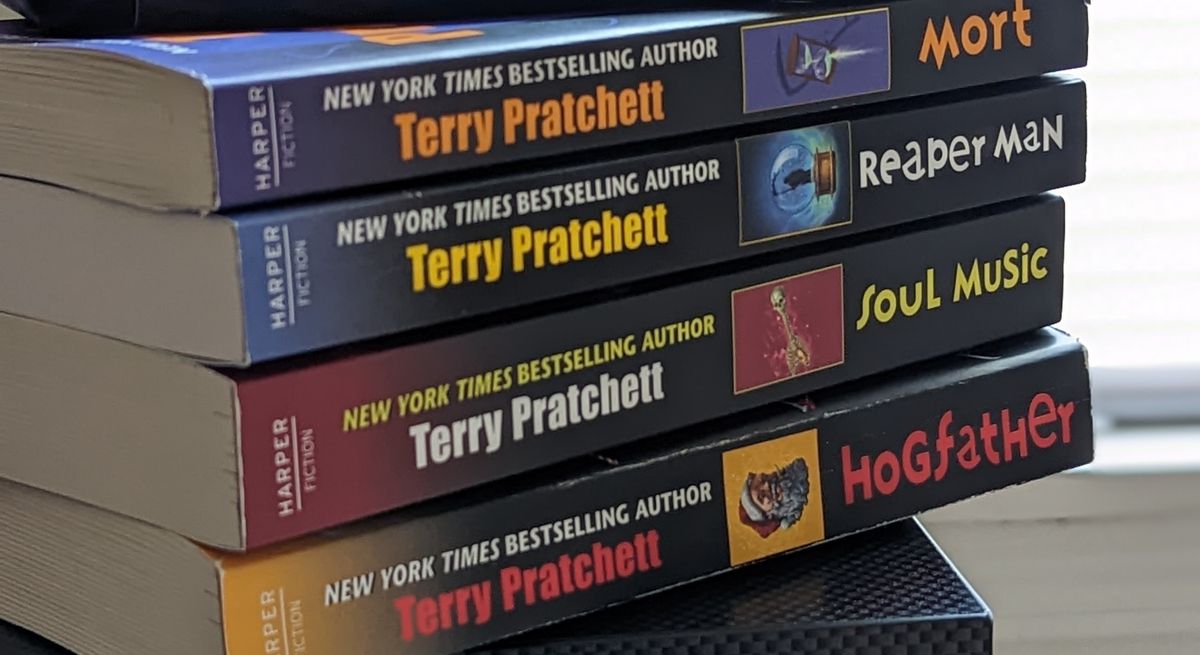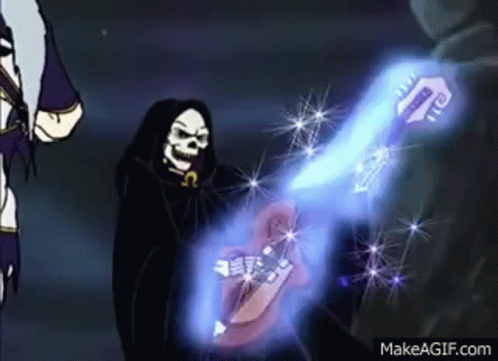Discworld - Death Sub series
My thoughts on Discworld's Death sub-series.

When I decided to rediscover the magic of reading, I expected to give up halfway through my first book. While Agatha Christie's "And there were None" was an excellent first stepping stone. The Death series is what helped me rediscover the joys of the written word. I am not exaggerating when I say I am better off for reading these five books.
What is it about?
In the first three books ( Mort, Reaper Man, Soul Music), Death finds himself not doing this job, leading to all kinds of shenanigans. Mort is a satire on stories about romance, Reaper Man - a satire on capitalism and Soul Music - that of 80's rock music scene. Among them all, Terry Pratchett explores what it is to be human - especially in Reaper Man.
Hogfather is the one that satirizes Christmas and fantasy, which I have talked about earlier. The last one - "Thief of Time" is something I am not sure about. It reads like a parody of action movies and philosophy. It was engaging and more fast-paced than the first four but I liked it the least. Death has the least amount of page presence here (is that a word like screen time?) than in the entire series.
The series at heart is not about magic despite it having fantasy elements. It is centered around vague occult concepts. After all, the central character is the anthropomorphic personification of Death. As such these concepts tend to be vague and give the writer a certain imaginative leeway. Yet, Sir Terry Pratchett finds a way to keep it grounded without losing the charm of unexplained mysticism.

What I liked?
I want to talk about two things - Why I liked the series and why it is an important one. Rather than committing to the narrative, stories of late try to evoke an emotional response by using cheap plot tropes. I am put off by this as it breaks the immersion. Instead of finding compelling characters, I am left with husks whose sole purpose is to drive the plot forward. This is most egregious in superhero movies where quips undercut the somber moments. On the flip side are the stories that focus on improbable misery or gore for no reason. The ones with the hard edge that make you ponder out loud - Why hasn't the protagonist not killed themselves already?
This leads me to conclude crafting a compelling story is a complicated affair. What is harder to do is write a humorous one. Sir Terry Pratchett's Death series is one of the rare ones which also gets the reader to ponder. Not to say it doesn't have its flaws. But its strengths more than make up for it. The world-building is inventive. The characters are compelling and consistent. The narrative style's humor can hardly be described as forced.
Nitpicks
Even though I never laughed out loud, I found myself chucking for the better part. But I didn't get all the pop culture references mentioned. So I would have to say the humor can be spotty but it differs based on the reader's experiences. Another issue I found is that the middle usually meanders a little but this is made up with a strong finish.
Why is it important to me?
The throughline here is that Death is constantly trying to understand humanity. While the books inadvertently touch upon the good side of humanity, they try to be as neutral as possible. They also don't come off as preachy. Stories like these, in my view, are there to remind us of little things we know but have forgotten. In Hogfather, there is a beautiful quote by Death.
HUMANS NEED FANTASY TO BE HUMAN. TO BE THE PLACE WHERE THE FALLING ANGEL MEETS THE RISING APE.
We need fantasies and stories to help and shape us into something more definite. To grow up is to become blind to the color of the world around us. Or that has been my experience. To rediscover the color, to become less cynical, and to believe in things like courtesy, compassion, and fascination, stories such as these do help. While cynicism is not inherently harmful, it needs to be checked and curtailed. And the tools to do so are stories such as these. Moreover they helped me to appreciate the camaraderie around me and become less apathetic.
Conclusion
I had a blast with these books. They made me chuckle, amused me, and helped me appreciate life as it is. While in the last section I mentioned why we need stories like these, it is more of why I needed them. I hope more of my friends pick up the Discworld Novels, but like Doctor Who, it is not everyone's cup of tea.
Nonetheless, I recommend picking up these books. On the series as a whole, I do rate them highly.
If you have any thoughts or questions, please feel free to reach out to me.